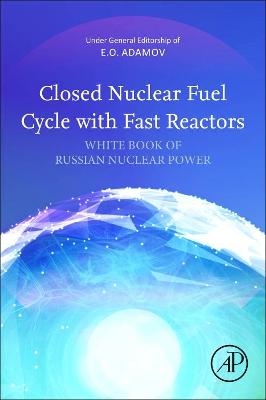
Closed Nuclear Fuel Cycle with Fast Reactors
Academic Press Inc (Verlag)
9780323993081 (ISBN)
Nuclear engineers and technologists of fast reactors, advanced reactors and fuel cycles will use this book as a guide to inform new technology development. They will be able to use the experiences from the Proryv Project to drive fast reactor development with closed fuel cycles for the future.
Evgeny Adamov is an honored scientist of the Russian Federation, Chairman of the Scientific and Technical Council of Rosatom State Corporation and author of more than 200 scientific publications and patents. Since 2012, research on the development of a new technological platform for nuclear power has been carried out as part of the “Proryv project, initiated by Professor Adamov and implemented under his scientific supervision. In the 1980s, E.O. Adamov launched scientific and technical activities in Russia to develop a new (fifth) generation nuclear technologies for large-scale nuclear power with closed nuclear fuel cycle (CNFC) and fast reactors, which allows to overcome the basic modern problems of nuclear energy production.
1. Introduction
Part I. Global power generation and the role of nuclear power engineering
2. Power generation and sustainable development
3. Role of nuclear power engineering in the Russian fuel and energy industry
Part II. Basic components of a new technology platform for nuclear power engineering
4. Fuel cycles of nuclear power engineering
5. Fuel supply
6. Prevention of severe reactivity-related accidents
7. Prevention of severe heat removal accidents
8. Codes for development and safety analysis of reactor plants
9. SNF and RW handling as a risk factor for the public
10. Radiation and radiological equivalence of RW for two-component nuclear power engineering
11. Technology support of the non-proliferation regime and conditions for export of the CNFC and FNR technologies
12. Economic competitiveness of innovative nuclear power engineering
Part III. Nuclear fuel and closing of the nuclear fuel cycle
13. Uranium and uranium-plutonium nuclear fuel
14. Dense nuclear fuel for fast reactors
15. Development of nitride fuel within the framework of Breakthrough Project
16. Mixed oxide fuel for fast reactors
17. REMIX fuel
18. Adaptation of uranium-plutonium fuel fabrication technologies
19. Usage of the industry-specific fuel infrastructure
20. Structural materials for fuel element claddings
21. SNF processing technologies
22. Radioactive waste management
Part IV. Advanced reactor technologies and the nuclear power engineering infrastructure
23. New generation reactor technologies within the framework of Generation IV International Forum
24. Development of technologies based on fast reactors
25. Fast reactors within the framework of Breakthrough Work Stream
26. Thermal reactors
27. Expansion of the nuclear power engineering application scope
28. Alternative reactor technologies
29. Superconducting power transmission technologies
30. Experimental facilities of nuclear power engineering
31. Digitalization in nuclear power engineering
32. Regulatory framework for the modern and future nuclear power engineering
Part V. Strategic guidelines for establishment of two-component nuclear power engineering
33. Optimal development scenarios for the Russian nuclear power engineering
34. Comparative analysis of the Russian nuclear power engineering development scenarios
35. Russian nuclear power engineering development variants for different integral capacity growth scenarios
Conclusion
Appendix
1. Potential biological hazard (PBH) of significant radionuclides in the nuclear power engineering waste from thermal and fast reactors in 2100
2. PBH of significant radionuclides in the nuclear power engineering waste from thermal and fast reactors subsequent to storage for 100 to 1000 years starting with 2100
3. PBH of natural uranium with the total mass of 541.7 thous. tons
4. Characteristics of fuel campaigns for light-water reactors in the closed NFC
5. Basic technical characteristics of power units with fast reactors
| Erscheinungsdatum | 09.03.2022 |
|---|---|
| Verlagsort | Oxford |
| Sprache | englisch |
| Maße | 152 x 229 mm |
| Gewicht | 720 g |
| Themenwelt | Naturwissenschaften ► Physik / Astronomie ► Thermodynamik |
| Technik ► Elektrotechnik / Energietechnik | |
| ISBN-13 | 9780323993081 / 9780323993081 |
| Zustand | Neuware |
| Informationen gemäß Produktsicherheitsverordnung (GPSR) | |
| Haben Sie eine Frage zum Produkt? |
aus dem Bereich


